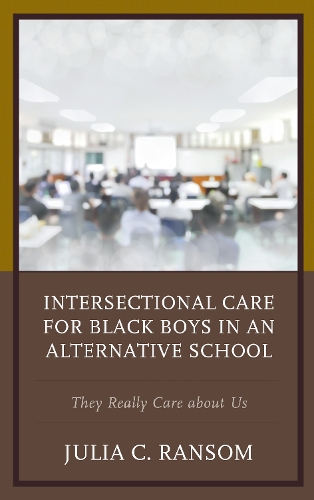
Intersectional Care for Black Boys in an Alternative School: They Really Care about Us
(Hardback)
Publishing Details
Intersectional Care for Black Boys in an Alternative School: They Really Care about Us
By (Author) Julia C. Ransom
Bloomsbury Publishing PLC
Lexington Books
23rd November 2018
United States
Classifications
Professional and Scholarly
Non Fiction
Urban communities / city life
Educational strategies and policy: inclusion
Educational strategies and policy
371.82996
Physical Properties
Hardback
160
Width 161mm, Height 230mm, Spine 17mm
395g
Description
Intersectional Care for Black Boys in an Alternative School is an exploration of the possibilities that exist within educational spaces for Black male students when teachers care for these students while also acknowledging the intersectionality of Black male identity and the potential oppression and resilience that they experience as the result. Through examples from adolescent Black males and their teacher in an urban alternative school for those pushed out of traditional high school settings, ways that teachers can embody and enact intersectional care are revealed. This book explores the importance of the ethic of care in teacher student relationships for young Black men and the influence of identity constructions that produce positive and negative educational experiences of Black boys who are outside of traditional schooling. The voices of the young Black men are centered in this story as they describe experiences of marginalization in traditional high schools prior to attending their alternative school, which for them was a caring space. Cultivating positive environments and student teacher relationships with intersectional care represent important strategies to engage young Black men in education.
Reviews
For some, it is difficult to envision schooling spaces that are loving and caring for Black boys. However, new scholarly efforts are shifting from deficit informed approaches to narratives of possibilities. This book deftly examines how a caring schooling environment uses social identities as a pedagogical device and in relationship building. Ransom helps us reimagine the power of caring adults and schools in the lives of students where education precarity has become commonplace. The ability to comprehend multiple social identity positions, such as race, class, gender and sexuality hinders authentic theorizing, which limits how Black boys in school come to know and to be known. With compelling narratives and analysis of students attending an alternative school in pursuit of a high school credential, Ransom accomplishes this with the same tenderness she reveals during the study. As a result, our understanding of alternative schooling transforms and this site emerges as a source of restoration and care. -- James Earl Davis, Professor, Temple University
Author Bio
Julia C. Ransom is a postdoctoral research scholar at Hunter College.
